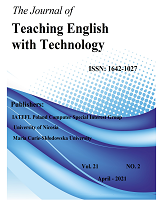THE EFFECT OF COMPUTER-ASSISTED GAMIFIED LEARNING ON STUDENTS' ATTITUDES AND PROGRESS IN ADVANCED GRAMMAR CLASS
THE EFFECT OF COMPUTER-ASSISTED GAMIFIED LEARNING ON STUDENTS' ATTITUDES AND PROGRESS IN ADVANCED GRAMMAR CLASS
Author(s): Anna TurulaSubject(s): Education, Foreign languages learning, Methodology and research technology, ICT Information and Communications Technologies, Distance learning / e-learning, Pedagogy
Published by: IATEFL Poland Computer Special Interest Group and The University of Nicosia
Keywords: focus on form pedagogy; technology-enhanced grammar learning; gamification;
Summary/Abstract: The paper looks at how an eclectic, gamified course design affects student attitudes to learning grammar as well as how effective such a design is in terms of final-exam results. Described and discussed here is a 2-year study investigating such digital enhancement in a Practical Grammar class. Carried out as experimental, the study involved 2 groups of first-year students of the English Studies programme at the Pedagogical University in Cracow, Poland. In the first research group (N1e=14), which underwent the treatment in the academic year 2016/2017, the traditional grammar class was replaced with a quasi- experimental instruction including elements of gamification, digital input flooding (including pull and push presentation techniques) and enhancement as well as collaborative (structure flashcards and grammar memes) and exploratory (structure samples from multimedia) learning of grammar. At the end of the course, the students’ result of the final grammar test were gathered and compared with the results of the population of first-year students (N1c=113) in whose case the traditional treatment (lecture on rules plus practice in class; practice at home). Additionally the students’ attitudes towards various aspects of the experiment were checked with a survey. The same treatment was repeated (N2e=13; N2c=78) in the academic year 2017/2018. Data analysis shows that while the experimental treatment proved equally effective examwise, various factors, such as learner individual differences and material specificity need to be taken into account.
Journal: Teaching English with Technology
- Issue Year: 21/2021
- Issue No: 3
- Page Range: 3-17
- Page Count: 15
- Language: English

